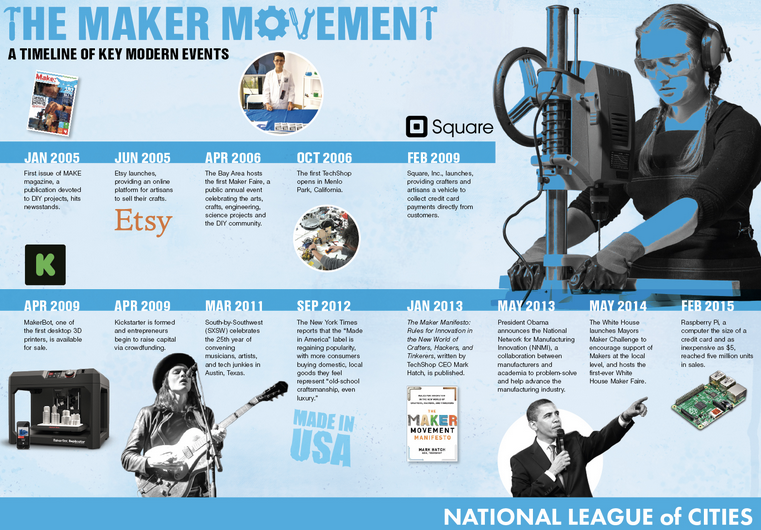New Report: How Cities Can Grow the Maker Movement
A new report including a maker movement timeline from the National League of Cities that some libraries/librarians might want to review and share with colleagues, government officials, and other members of their communities.
From News Release/Summary:
A new report [recently] released from the National League of Cities (NLC) examines the “maker movement” and identifies what cities can do to create, support and grow maker communities locally. “How Cities Can Grow the Maker Movement”, a first-of-its-type analysis of the maker movement, finds that 26 percent of U.S. cities have makerspaces, and highlights 10 city examples to define the movement and analyze what role local policy can play in the movement’s success.
“Only 26 percent of American cities are engaging in the maker movement, which is shown to have a positive economic impact in cities,” said Clarence E. Anthony, CEO and executive director, National League of Cities. “Across the country, cities are working hand-in-hand with maker communities to invest in makerspaces and encourage entrepreneurialism. This city-level support has helped to cement the role of makers as potential job creators and conduits for economic growth. With this new report, cities can learn how to become engaged and benefit from the maker movement.”
The report brings definition to an often unclear understanding of the maker movement, which can include everything from small production manufacturing to prototyping to tech workshops. Many cities that have invested in makerspaces in their communities have seen a positive economic return. In cities like Eugene, Ore. and Chattanooga, Tenn., conversion of city buildings into makerspaces and prioritizing high-speed connectivity has attracted capital, talent and industry.
Direct to Full Text Report (28 pages; PDF)
Maker Movement City Profiles
(Also Included in Complete Report)
- Albuquerque, NM
- Austin, TX
- Boulder, CO
- Burlington, VT
- Chattanooga, TN
- Eugene, OR
- Louisville, KY
- Madison, WI
- Philadelphia, PA
- San Francisco, CA

About Gary Price
Gary Price (gprice@gmail.com) is a librarian, writer, consultant, and frequent conference speaker based in the Washington D.C. metro area. He earned his MLIS degree from Wayne State University in Detroit. Price has won several awards including the SLA Innovations in Technology Award and Alumnus of the Year from the Wayne St. University Library and Information Science Program. From 2006-2009 he was Director of Online Information Services at Ask.com.


